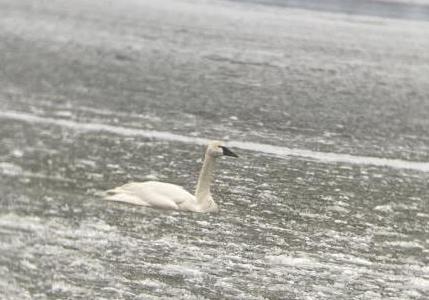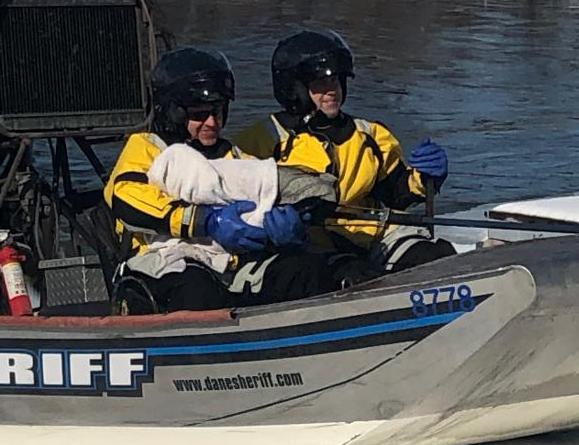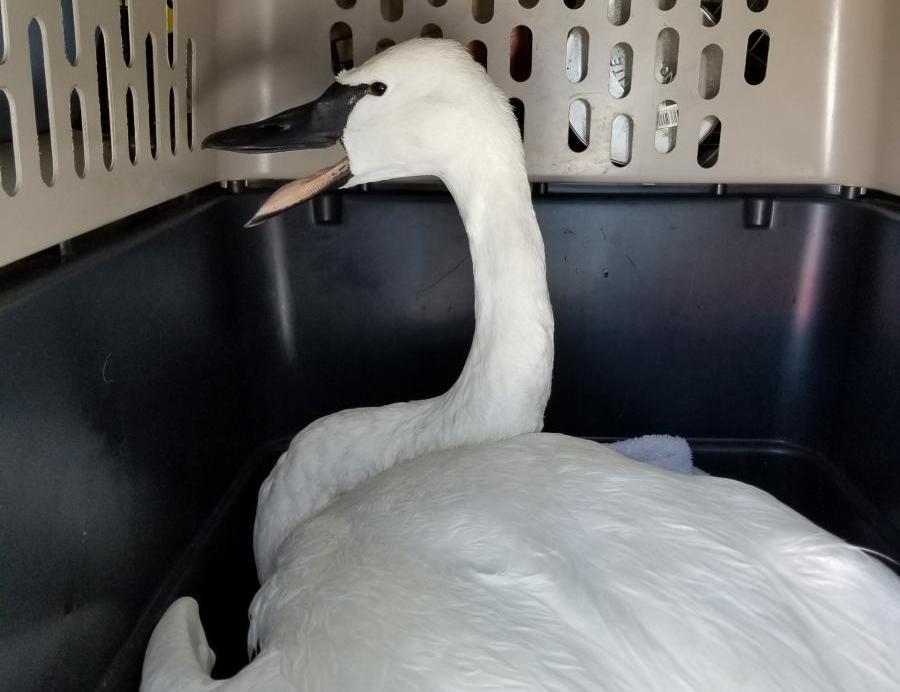Separate Lake Rescue Incidents Prompt Call To 'Get the Lead Out' Of Our Lakes
posted

January 12. It later died of lead poisoning.
Last week, the MFD Lake Rescue Team was dispatched to Tenney Park where a tundra swan appeared to be struggling off the shores of Lake Mendota. Animal Service Officers hadn’t seen the swan move from its location in 24 hours, causing concern for its welfare.
Deploying their airboat, Lake Rescue safely captured the swan and turned it over to Animal Services. Rescuers described the swan as "alert but very lethargic."
The story was reminiscent of another Lake Rescue call— one that took place four weeks earlier. Another tundra swan was feared to be frozen to the ice near Picnic Point. The swan wasn’t frozen. It was sick.
Hours after it was rescued, wildlife rehabilitators with the Dane County Humane Society Wildlife Center announced they were unable to save the swan. It died of lead poisoning, and X-rays revealed fishing tackle still in its digestive tract.
The swan rescued last week also tested positive for lead toxicity, with lead readings literally off the charts. Blood samples were sent off to another facility, which determined there were lead levels of 310 ug/dL in the bird's bloodstream. Levels above 10 ug/dL are considered toxic.

shore. The swan remains in treatment for lead toxicity.
Even at 310 ug/dL, this swan’s toxicity is lower than the first swan's, which had a lead level of over 800 ug/dL.
The culprit, according to wildlife rehabilitators, is likely lead fishing tackle.
Fortunately, X-rays of the swan rescued last week showed no fishing tackle in its digestive tract, allowing rehabilitators to focus on getting the lead out of its bloodstream.
Using a treatment method called chelation, medications administered to the bird bind to lead and other heavy metals in the blood and remove those metals from the body. The swan began treatment last week and will be tested again this week. Rehabilitators hope they see a decreased lead level in the next round of results.
These cases prompt a call to anglers to consider alternative, lead-free fishing products when heading out to the lakes.

Anything above 10 ug/dL is considered toxic.
“Lead is in the environment already, but we don’t want to add to it,” said DCHS wildlife rehabilitator Sarah Karls.
Even the most careful anglers can lose a line or two in the water. For these birds, just a little bit of lead can cause a big, life-threatening problem. Visit the Wisconsin DNR's website to learn how you can help Get the Lead Out of our environment.
Rehabilitators report the swan rescued last week is doing well in their care, but they anticipate it will be there for quite some time.
“It’s hard to know if it’ll fully recover,” Karls said. “We’re taking it one day at a time.”
Subscribe to Fire Blog Updates
Archive
- Fire Sprinkler Week: The Environmental Benefits of Sprinklers
- Fire Sprinkler Week: Where in Your Home Do Fire Sprinklers Need to Be?
- PHOTOS: Heavy Urban Rescue Team Responds to Kettle Moraine for Plane Crash
- Fire Sprinkler Week: Protecting Your Home and Your Drinking Water
- Home Fire Sprinkler Week: How Do Fire Sprinklers Work?
- Asst. Chief (Ret.) Arthur Dinkins III Broke Glass Ceiling for Black Firefighters at MFD
- Lt. (Ret.) Hubert McKenzie's Legacy Carries On Through Lessons Shared
- 'The Dream Is In the Journey' - Catching Up With Paramedic (Ret.) Leotha Stanley
- Firefighter (Ret.) Kat Jackson Reflects on Career, Calls on Black Women to Join the Fire Service
- Meet Firefighter Austin Kuhl
- Meet Firefighter Meredith Brezinski
- Meet Firefighter Kevin Julka
- Community Paramedics Pivot to Testing, Outbreak Response During COVID-19
- Meet Firefighter Diondrae Jenkins
- Meet Firefighter Chris Villanueva
- Meet Firefighter Bree Bower
- Meet the MFD's Newest Firefighters
- Calling All Artists: Fire Station Mural Project Aims to Celebrate the Spirit of the South Side
- Meet Firefighter Dontrell McIntyre
- Meet Firefighter Michael Sepulveda
- Meet Firefighter Allie Feys
- Meet Firefighter Chelsea Utzerath
- Meet Firefighter Heather Seeber
- Meet Firefighter Devin Rogers
- Meet Firefighter Jessie Bowden
- Meet Firefighter Seth Dahmen
- Meet Firefighter Josh Popanz
- Meet Firefighter Ryan Liss
- Meet Firefighter Lexi Wagner
- Meet Firefighter Julie Griessmeyer
- Meet Firefighter Jay Watson
- Meet Recruit Class 8!
- Rick Mulhern, Leader In Technical Rescue and Peer Support, Retires From MFD
- Burn Awareness Week: About UW Hospital's Burn Center
- Burn Awareness Week: Identifying and Treating Burns
- Burn Awareness Week: Sunburn and Frostbite
- Burn Awareness Week: Home Oxygen Safety
- Burn Awareness Week: Preventing Cooking-Related Scalds and Burns
- Meet Firefighter Brennan Boughton
- Meet Firefighter Mike Lothe
- Meet Firefighter Mitch Hanson
- Meet Firefighter Sam Coenen
- Meet Firefighter Marshall Angst
- Meet Firefighter Brandon Courts
- Meet Firefighter Grahm Yahn
- Meet Firefighter Tom Shannon
- Meet Firefighter Joe Parrillo
- Meet Firefighter Ryan Dostalek
- MFD Introduces Recruit Class 7!
- MFD's Community Education Division Teaches Kids To BE AWARE
- LEARN Two Ways Out Of Every Room
- LISTEN For The Sound Of The Smoke Alarm
- LOOK: Fire Hazards May Lurk In Your Home
- First Annual Richard Garner Memorial Ride Raises Over $14,000 For Scholarship Fund
- Meet Lieutenant Zak Smith
- Meet Lieutenant Eric Mills
- Meet Lieutenant Liza Tatar
- Meet Lieutenant David Crossen II
- Four New Lieutenants Assume Position At Area Fire Stations
- National EMS Memorial Bike Ride Pays A Visit To Station 4
- Engine 10 Helps Reunite Mama Duck With Four Stranded Ducklings
- New Aerial Platform Ladder Truck Hits The Road On Madison's West Side
- Show Us Your Smarts: Take the Home Fire Sprinkler Quiz!
- Fire Sprinkler Protection: See the Difference!
- Hiding In Plain Sight: Choosing Concealed Fire Sprinklers
- The Truth About Home Fire Sprinklers
- Seconds Matters: How Home Fire Sprinklers Save Lives
- Meet Firefighter Michael Samosky
- Meet Firefighter Nickolas George
- Meet Firefighter Desmond Leidich
- Meet Firefighter Kyle Kampmeier
- Meet Firefighter Jonathan Clinkscale
- Meet Firefighter John Clooten
- Meet Firefighter McKinnan Stamschror
- Meet Firefighter Ryan Raisbeck
- Meet Firefighter Daniel Ramirez
- Meet Firefighter Brett Bower
- Meet Firefighter Bryce Powell
- Meet Firefighter Daniel Congdon
- Meet Firefighter Larry Moen
- Meet Firefighter Charles Campbell
- Meet Firefighter Casey Endres
- Meet Firefighter Benjamin Nevarez
- Recruit Class 6 Reports For Duty
- New Solar Panels Installed At Fire Station 12
- Fire Prevention Week: Easy-To-See House Numbers Help Us Find You Faster!
- Fire Prevention Week: Practice Your Escape Plan!
- Fire Prevention Week: How To Make A Home Fire Escape Plan
- Fire Prevention Week: Every Second Counts -- Know 2 Ways Out!
- Now Accepting Firefighter Applications!
- CampHERO for Women Coming Up Saturday!
- Madison Launches 'PulsePoint Verified Responder' Pilot Program
- Meet Lieutenant Jeffery Vogen
- Meet Lieutenant Chris Hammes
- Meet Lieutenant Wes Ecker
- Meet Lieutenant Chris Carbon
- Meet Lieutenant Linnea Anderson
- Meet Lieutenant Dan Williams
- MFD Introduces Six New Lieutenants!
- Upcoming Community Events!
- ER Docs Dive Into Firefighting During 'Doc Ops Day'
- MFD Lends Helping Hand At Gilbert Brown Football Camp
- Special Delivery: “Beltline Jax” Makes A Grand Entrance
- New Lease On Life: Oregon Man Reconnects With Crew That Helped Save Him
- 235 New Smoke Alarms Move Into Sherman Terrace!
- Captain Todd Steyer Wraps Up A Fulfilling 30-Year Career With MFD
- EMS Q&A: Where can I learn CPR?
- EMS Q&A: Did you know MFD paramedics are also firefighters?
- EMS Q&A: What should I expect after calling for an ambulance?
- EMS Q&A: What’s the difference between an EMT and a Paramedic? How many paramedics are on duty?
- EMS Q&A: Why does a fire truck come when I call for an ambulance?
- Meet Firefighter Maj-Britt Williams
- Meet Firefighter Adam Thimmig
- Meet Firefighter Ruth Savard
- Meet Firefighter Mike Reisman
- Meet Firefighter Trent Meicher
- Meet Firefighter Jonathon McCray
- Meet Firefighter Adam Lesser
- Meet Firefighter Patrick Johnson
- Meet Firefighter Kyle Homan
- Meet Firefighter Joe Gangler
- Meet Firefighter Justin Fehrenbach
- Meet Firefighter Matthew Dykstra
- Meet Firefighter Brandon Douglas
- Meet Firefighter Tamara Dinkel
- Meet Firefighter Marta Darrow
- Meet Firefighter Davy Calkins
- Meet Firefighter Ryan Beckwith
- MFD Introduces 18 New Firefighters!
- A Greener Firehouse: How Fire Station 12 LEEDs the Way
- Meet AE Brad Vogen
- Meet AE Vince Soto
- Meet AE Chad Powell
- Meet AE Daniel Pazurek
- Meet AE Todd Mahoney
- Meet Apparatus Engineer Cole Christenson
- Meet AE Derek Brown
- New Apparatus Engineers Now Serving In Your Neighborhood!
- Dane County EMS Banquet Honors Survivors, Responders Involved In Cardiac Saves
- On This Day In History: The First 911 Call Is Placed In 1968
- PHOTOS: Getting Up Close With The Lake Rescue Team
- Sable Flames "Second Alarm" Benefit Enters Its 24th Year
- Madison's Iranian Community Comes Together To Honor Firefighters
- Building Connections, Inspiring Kids: Engine 12 At Olson Elementary School
- Welcome Home: Cooper's Hawk Returns To Willy Street
- The Results Are In: 91 Donations Collected During the “Never Forget” Blood Drive
- Meet AE Ethan Dade
- Meet AE Wade Raddatz
- Meet AE Lance Radock
- Meet AE Jacob Conner
- Meet AE Dan Smith
- Meet AE Kevin Hembrook
- National Preparedness Month: Special Needs Disaster Planning
- Meet AE Tom Winter
- Meet AE Lori Karst
- MFD Introduces Eight New Apparatus Engineers
- Generous Grant Brings New "Jaws Of Life" Equipment To Ladder 6
- National Preparedness Month: Creating Communication and Evacuation Plans
- National Preparedness Month: Don't Wait. Communicate.
- “Doc Ops Day” Gives ER Docs A Taste Of Firefighter Life
- Two Years After Accident, Family And First Responders Celebrate 'A Miracle'
- Madison Fire Aims To Keep Injuries Well Under Par At PGA Championships
- “It’s Been A Great Ride," Says Retiring Driver John Lucille
- A Thank-You Gift For All To Enjoy
- “Friday Nights At the Y” Returns In 2016
- Meet Lt. Lisa Becher
- Meet Lt. Derek Teff
- Meet Lt. Casey Preimesberger
- Resources For Candidates Preparing For the Physical Ability Test
- Meet Lt. Sue Juedes
- Meet Lt. Ted Higgins
- Meet Lt. Matthew Mialik
- Meet Lt. Michael McCartney
- MFD Introduces Seven New Lieutenants
- Inside The Galaxie: Making Madison's Newest High Rise Safer For All
- Edgewood Students Donate Stuffed Animals For Kids Experiencing Trauma
- Apparatus Engineer "Recon Bob" Says Goodbye After 25 Years Of Service
- New Boat Enhances MFD Lake Rescue Capabilities
- With Gratitude, Division Chief Ron Schwenn Bids Farewell To the MFD
- New Training Technology Aims to Offer Full Immersion, Minus the Risks
- In the Midst Of Transitions, Our Crews Don't Miss A Beat
- Finance Manager Rita Johnson Retires After 44 Years With the City
- Farewell to West District Captain Tom Reiter
- Meet Firefighter Caluster Buie
- Meet Firefighter Steven Foulks
- Meet Firefighter Richard Miyagawa
- Meet Firefighter Joshua Balli
- Meet Firefighter Matthew Boyle
- Meet Firefighter Oscar Castillo
- Meet Firefighter David Bartkowiak
- Meet Firefighter Christopher Staveness
- Meet Firefighter Michael Guerten
- Meet Firefighter Marcus Bobholz
- Meet Firefighter Joshua Ramsey
- Meet Firefighter Michael Olson
- Meet Firefighter Eric Popovich
- Meet Firefighter Paul Schecklman
- Meet Firefighter Brian Tremain
- Meet Firefighter Cameron Gasaway
- Meet Firefighter Vaughn Brockel
- Why We Do What We Do: Remembering the Our Lady of the Angels Fire
- Meet Firefighter Brian Bieganski
- The Madison Fire Department Prepares For Inaugural "Shake the Lake" Event
- The Heavy Urban Rescue Team Practices Life-Saving Skills
- Safety Saturday 2015: A Day In Photos
- Firefighter Fun Day 2015 is Saturday, August 8
- Retired Firefighter Tim Healy Inducted Into Madison Sports Hall Of Fame
- Firefighter Ty Stebbins Sworn In
Categories
- All Posts »
- Emergency Medical Services (24)
- General (399)
- Join MFD (17)
- Station 1 (72)
- Station 10 (73)
- Station 11 (44)
- Station 12 (61)
- Station 13 (50)
- Station 14 (32)
- Station 2 (60)
- Station 3 (70)
- Station 4 (62)
- Station 5 (68)
- Station 6 (64)
- Station 7 (74)
- Station 8 (71)
- Station 9 (63)
- Your Safety (44)
Tags
- A Day In The Life Of A Madison Firefighter
- AASPIRE
- AED Training
- Alix Olson Award
- Awards & Recognition
- Battle Of the Badges
- Black History Month
- Burn Awareness Week
- CampHERO
- Class of 1980
- Community Education
- Community Outreach
- Community Paramedicine
- COVID-19
- CPR Training
- Dane County Public Safety Communications
- Family Events
- Fire Academy
- Fire Engine
- Fire Investigation Team
- Fire Prevention
- Fire Prevention Division
- fire prevention month
- Fire Prevention Week
- Fire Safety School Tours
- Fire Stations
- Fire Training Division
- Firefighter Fun Day
- Firefighter/EMT Recruitment
- Friday Nights at the Y
- Hazmat Team
- Health/Wellness
- Heavy Urban Rescue Team
- Hiring & Promotions
- HIT
- Holiday Safety
- Home Fire Sprinklers
- Inspections
- International Women's Day
- Internships
- Join the Team
- Lake Rescue Team
- Madison Fire EMS
- Meet the MFD
- MFD Behind the Scenes
- MFD History
- MFD Mailbag
- MFD Prevention Division
- National Preparedness Month
- Open House
- Our Lady Of the Angels
- Paramedics
- Peer Support
- Pet Safety
- Public Health
- Public Safety
- PulsePoint
- Sable Flames
- Safety Tips
- Safety Town
- Shake the Lake
- The American Center
- Training & Professional Development
- UW
- UW Health
- Wanda Fullmore Youth Internship Program
- Winter Safety
- Women's History Month
